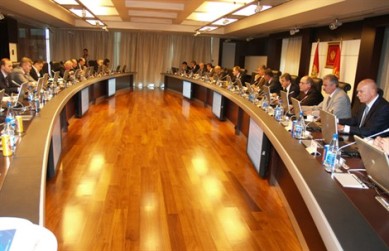 (Podgorica, 30 May 2013) – The Government of Montenegro has in previous years missed a number of opportunities to preserve fiscal stability and secure sustainable sources of budgetary revenues, under the pretext of allegedly wanting to attract foreign investors through tax breaks. The analysis prepared by MANS’ research team shows that the government adotped a series of devestating laws in the realm of tax policy, whose consequences are now being ‘corrected’ by introducing a regressive VAT at the expense of citizens.
(Podgorica, 30 May 2013) – The Government of Montenegro has in previous years missed a number of opportunities to preserve fiscal stability and secure sustainable sources of budgetary revenues, under the pretext of allegedly wanting to attract foreign investors through tax breaks. The analysis prepared by MANS’ research team shows that the government adotped a series of devestating laws in the realm of tax policy, whose consequences are now being ‘corrected’ by introducing a regressive VAT at the expense of citizens.
It’s clear that the balance between budgetary revenues and expenditures was brutally demolished when the government effectively fastened the KAP [Podgorica Aluminum Combine] to the state budget, which illustrates the analyses of international institutions. However, it is far from true that increasing the VAT is the only measure that can correct fiscal stability in the country.
That is, information obtained by MANS demonstrates that the Tax Administration projected receipts of €19.7-million this year from taxes on corporate income, whereas last year it received €64-million from the same source (a difference of €44-million).
Given that the governemnt decision to increase the VAT was justified by the argument that it would contribute €37-million to the state budget, it is clear that the new tax increase, which will affect the poorest citizens the most, is being introduced for no reason, since the government has an alternative source of revenue (the collection of existing corporate income taxes).
Furthermore, the government introduced a measure in which companies earning profits in excess of €100,000, can pay their taxes through apartments and office space, which has slowed down the actual payment of the tax, while opening up substantial room for manipulating real estate assessments and reducing the operational funds obtained.
However, its worth noting that there’s considerable room for establishing fiscal stability since the corporate tax rate here is a flat 9% across the board, the lowest in the whole of Europe. In the region, in Serbia, Bosnia and Macedonia, this tax is 10%, while in Slovenia it is 17%, in Croatia 20%. Similarly, in Romania it is 16%, while in Slovakia and Poland it stands at 19%.
When it comes to developed European economies, the tax rate is much higher, demonstrating that these states earn substantially from taxing corporate earnings. In Italy the rate is 27.5%, in Germany it is 29-32% and in France it is 33%.
The corporate income tax rate was reduced in 2005, from 15% for profits up to €100,000 and 20% for profits exceeding that amount.
The analysis prepared by MANS’ research team clearly demonstrates how much the government sought to displace the fiscal burden onto citizens in order to serve the profit-motive of tycoons. If only the government matched the coporate task to the one prevailing in the region or with that prevailing in the EU, it would considerably increase tax revenues.
According to official data obtained by MANS, since 2005 (when the corporate tax rate was reduced from 15-20% to a flat 9%), the state received €312.4-million in taxation on corporate profits.
If the tax rate remained at 15%, the budget would have received €553.5-million, i.e. an extra €221.4-million. If the tax rate was somewhat higher, say somewhere in between the Croatian and Slovenian rates (perhaps 18.5%), then in the previous period they would have earned €682.7-million (that is €330-million more than the Government earned since 2005).
Thus, the Government still has an alternative to cover the budgetary deficit caused by its catastrophic post-privatization policy towards the KAP and other firms tied to local and global tycoons, for which it has set aside millions of euros in state guarantees, without a proper strategy other than irresponsibly increasing its debt with international financial institutions, all of which the economically destroyed citizenry is expected to pay.
For this reason, MANS is requesting that the sustainability of the budget’s incomes and expenditures be opened to a broad public debate, since we’re convinced that other solutions exist for the filling of the budget, instead of the brutal and on-going digging into the pockets of the poorest social classes for whatever is left.



